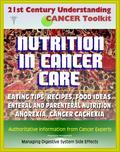Authoritative information, tips, and practical advice from the nation's cancer experts about nutrition in cancer care, providing coverage of all aspects of this important part of cancer treatment. Starting with the basics, and advancing to detailed patient-oriented information, this comprehensive compilation gives empowered patients, families, and caregivers the information they need to understand nutrition and cancer. Digestive problems related to chemotherapy, radiation treatment, and surgery are fully covered; there is information about anorexia and cancer cachexia, enteral and parenteral nutrition, supplements, and much more. In addition to easy-to-read discussions, there is substantial advanced material for health care professionals. Conveniently organized contents include: Eating Hints - Before, During, and After Cancer Treatment * Down Home Healthy Cooking: Recipes and Tips for Healthy Cooking * Managing Chemotherapy Side Effects - Appetite Changes * Nutrition in Cancer Care - Patient Version and Healthcare Professional Version * For Cancer-Related Appetite Loss, Cannabis is No Better than Placebo * Hydrazine Sulfate * Supplement: General Cancer Information And Resources. An extensive supplement provides background data on cancer; information on how to find resources in your own community; questions and answers about cancer; cancer information sources; cancer in the environment - what you need to know and what you can do; and facing forward - life after cancer treatment. * Coverage includes: Overview of Nutrition in Cancer Care * Nutrition Therapy in Cancer Care * Methods of Nutrition Care * Effects of Cancer Treatment on Nutrition * Treatment of Symptoms * Food and Drug Interactions. Nutrition therapy is used to help cancer patients get the nutrients they need to keep up their body weight and strength, keep body tissue healthy, and fight infection. Eating habits that are good for cancer patients can be very different from the usual healthy eating guidelines.


